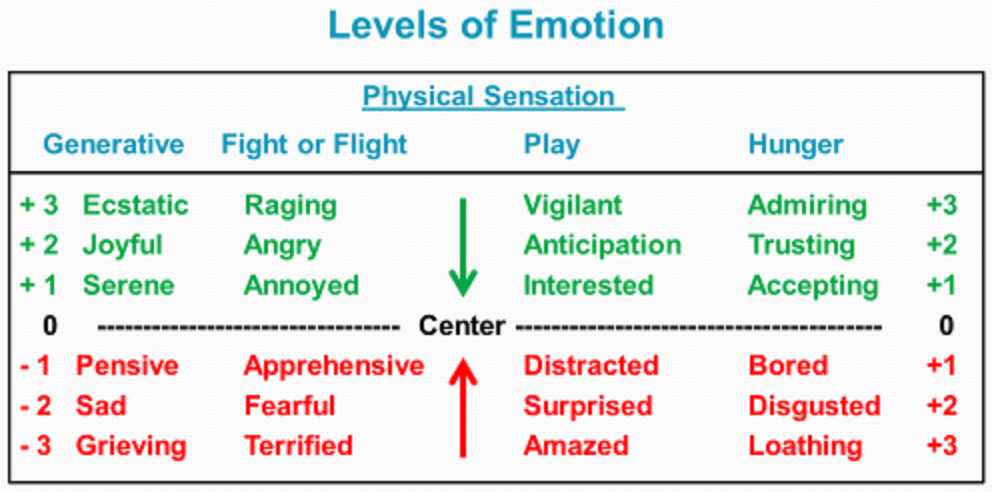Emotional health is experiencing the full spectrum of emotions in a healthy way, not only feeling ‘positive emotions’
/By Duncan Anderson. To see all blogs click here.
Summary:
*note: “!=” means “not equal to”
Healthy emotions != positive emotions
Unhealthy emotions != negative emotions
IMO emotional health is feeling the full spectrum of emotions in a healthy way, not only feeling ‘positive emotions’
What does this blog contain?
1. A few different models for the spectrum of emotions
2. How to experience ‘negative’ emotions in a healthy way?
3. How to experience ‘negative’ emotions in an unhealthy way?
4. How to experience ‘positive’ emotions in a healthy way?
5. How to experience ‘positive’ emotions in an unhealthy way?
+++++++++++++++++++
Details:
What is the ‘spectrum’ of emotion? A couple of models for you:
How to feel ‘negative’ emotions in a healthy way? How to feel ‘negative’ emotions in an unhealthy way?
Healthy frustration vs unhealthy frustration:
“The reasonable person adapts themselves to the world, the unreasonable person adapts the world to them. Therefore all progress depends on the unreasonable person.”
If you think something about the world can be improved then it could well frustrate you!
Frustration done healthy way = motivation to improve something.
You see that secondary school textbooks often don’t have answers for questions in them.
You have a ‘small’ frustration response.
This causes you to talk to people about how you feel having answers in textbooks will massively improve education.
Result: You form a team / company and build a new textbook with answers.
Frustration done unhealthy way = get pissed off and have people dislike you
You see that secondary school textbooks often don’t have answers for questions in them.
You have a ‘large’ frustration response.
This causes you to angrily talk to people about how you feel not having answers in textbooks is stupid, and that this NEEDS to be done.
Instead of coalescing a team to solve this problem you have people think you are unreasonable and think ‘I don’t want to work with that person.’
Result: You do NOT form a team / company and build a new textbook.
Healthy grief vs unhealthy grief:
“The opposite of love is not hate, it’s indifference.”
If you care about someone and you lose them then I would argue you should grieve. If you don’t grieve did you really care about them?
I don’t want to go through life not caring about things, I want to care deeply about MANY things!
Something good happens to someone / something you care about = happy
Something bad happens to someone / something you care about = sad
Healthy grief:
Grief can be you remembering what was so special about someone you have lost. Reminiscing about the good times you have had and that unfortunately you won’t have more time with them.
Grief done well helps you value good moments (as you have a deeper appreciation of the ephemerality of life).
Result: Grief (aka knowing bad, aka where south is) can help you know where north is (aka good). There is no north without south. Feeling strongly about someone or something in both a positive and negative sense to me can be one of the most beautiful things in life. I don’t want only one colour, I want all colours under the rainbow… in a healthy fashion!
But more than this. I find the more ‘colours’ you have the more interesting each individual colour is. Ie adding a new ‘colour’ to your life makes all the existing ‘colours’ more vivid.
Unhealthy grief:
You lose someone or something you care about but you block it out and try to shut out any ‘negative’ emotions stemming from the loss.
Result: You miss the opportunity to learn about what was important and good (ie calibrate where south is and hence where north is, ie to add new colours to your palate).
You may also need to process your grief and locking it away could well mean it surfaces later is counter productive ways.
How to feel ‘positive’ emotions in a healthy way? How to feel ‘positive emotions in an unhealthy way?
A ‘win’ in a health way vs a ‘win’ in an unhealthy way:
Unhealthy ‘win’
You are working on a project at work and you have a breakthrough solving a key ‘technical problem’.
You don’t stop to ‘smell the roses’ / ‘pop the champagne’ for yourself or with your team.
You are so busy that you immediately charge on with the next item.
This doesn’t allow you to be grateful. This doesn’t allow you to build camaraderie with your coworkers. This doesn’t allow you to thank someone.
Effectively there is all this positivity that you are stealing from yourself and the people in your team.
Healthy ‘win’
After a ‘win’ you stop and celebrate sufficiently.
This can be just a ‘this is so cool!’ with a couple of people. It can be a high five. It can be ‘great job, I really like how you did X here.’
It might be a more formal celebratory dinner with the team.
For myself, when something good happens, I like to take a quiet minute at my desk, close my eyes and just let the feeling wash over me. THE BEST! Then I’ll try and say something to someone else (eg ‘this is so cool’).
Joy = feeling good unadulterated by thought. Just a pure feeling of good I find so therapeutic. Don’t rob yourself of these little happy hits!
That’s it people.



